Immerse yourself in the enigmatic world of Bozrah in the Bible, where ancient prophecies and archaeological mysteries await your discovery.
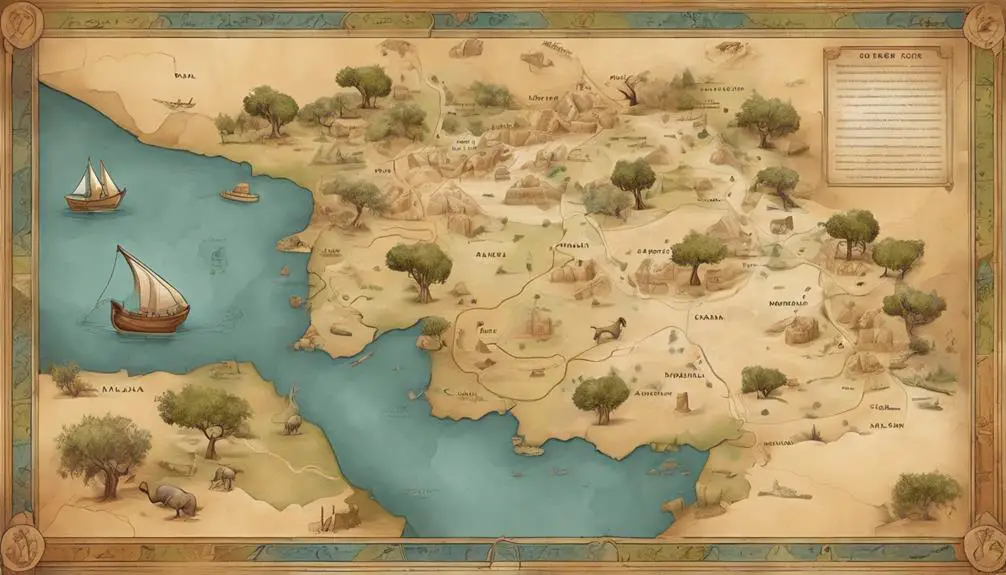
Bozrah in the Bible Map
Navigating the historical landscape of Bozrah in the Bible is like piecing together a puzzle from the past; each fragment tells a story of its own.
You'll find that Bozrah's geographic setting not only provides a backdrop to its biblical significance but also holds clues to understanding the everyday lives and spiritual landscapes of its ancient inhabitants.
As you explore further, you'll uncover how archaeological discoveries have reshaped our understanding of this intriguing city, and why its mention in prophecy and legend continues to spark debate among scholars.
The journey into Bozrah's past is far from over, and you're on the verge of discovering why its history remains relevant today.
Key Takeaways
- Bozrah's strategic location on trade routes made it a significant biblical site.
- The city's prosperity and cultural richness are highlighted in biblical narratives.
- Bozrah's religious and cultural significance is evidenced through archaeological discoveries.
- Mentioned in prophecy, Bozrah's biblical legacy intertwines with divine judgment and salvation themes.
The Geographic Setting of Bozrah
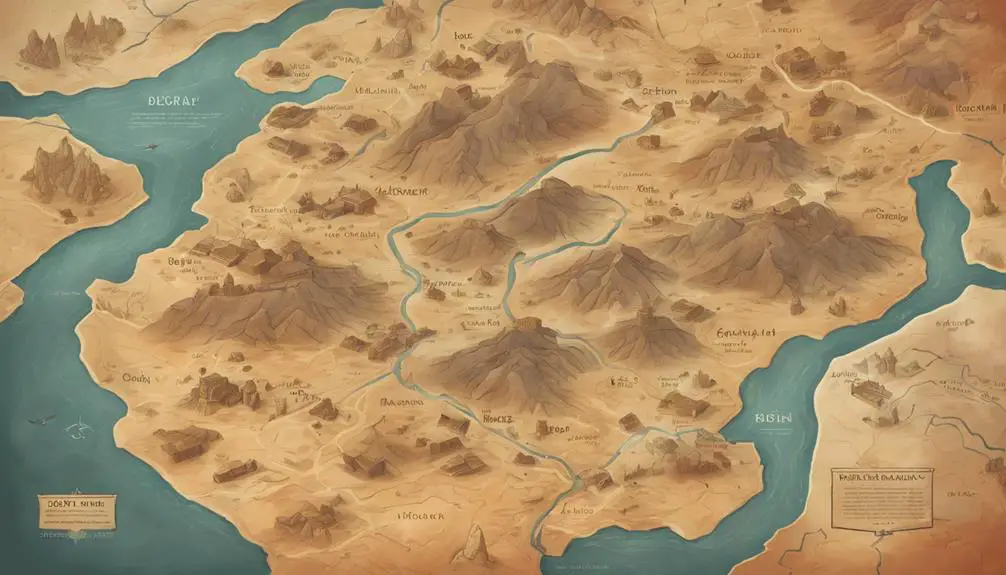
Bozrah, historically nestled in the rugged terrain of Edom, presents a compelling study of ancient urban development influenced by its strategic location and natural resources. You'd find that its position wasn't coincidental but a product of careful selection, optimizing the intersection of various trade routes that threaded through the region. These paths were the lifelines of commerce, connecting the Mediterranean with the Arabian Peninsula, and Bozrah stood as a sentinel overseeing this flow of goods, culture, and ideas.
The climate influences that shaped Bozrah's development can't be understated. The arid conditions and harsh landscapes surrounding Bozrah dictated a unique adaptation strategy for its inhabitants. You'd see that water management and agriculture were ingeniously designed to harness the scant resources available. This adaptation not only ensured survival but also propelled Bozrah to a prominent position in the region, leveraging its control over water sources and arable patches of land as a means to influence and facilitate trade.
Moreover, the strategic significance of Bozrah was amplified by its role as a hub on the incense and spice trade routes. These routes weren't just commercial lifelines; they were the arteries of cultural exchange and political power in the ancient Near East. You'd observe that the city's prosperity was closely tied to its ability to serve as a nexus for traders, travelers, and caravans, offering a meeting point that bridged distant worlds across deserts and mountains.
Bozrah in Biblical Times
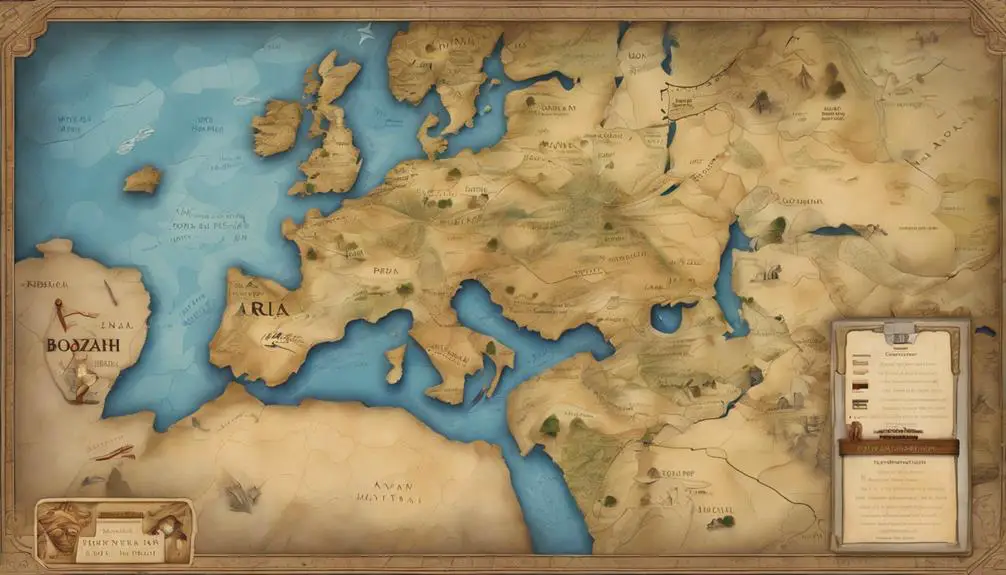
During biblical times, you'll find that the city's strategic location and economic prowess significantly influenced the narratives and events recorded in the scriptures. Bozrah, now a name etched in history and religious texts, was more than just a dot on ancient maps. Its economy and cultural practices played pivotal roles in shaping its identity and influence in the region.
Analyzing Bozrah during these times reveals:
- Economic Foundations: At its core, Bozrah's economy thrived on trade and agriculture. Its strategic position on trade routes allowed for the exchange of goods, ideas, and cultural practices with neighboring regions. This economic vigor provided the city not just with wealth, but also with a diverse cultural landscape.
- Agricultural Prowess: The surrounding fertile lands contributed to Bozrah's agricultural success. The city was known for its vineyards, olive groves, and grain fields, which were vital for sustenance and trade. This agricultural abundance supported not only the local economy but also played a significant role in the city's social and religious practices.
- Cultural Practices: Bozrah was a melting pot of cultural practices, influenced by its economic activities and interactions with neighboring regions. Religious rituals, social customs, and artistic expressions were deeply intertwined with its economic foundations, reflecting a society that valued both prosperity and cultural richness.
- Artistic Endeavors: The city's wealth and cultural diversity also fostered artistic endeavors. Craftsmanship in pottery, textile, and metalwork was notable, reflecting the city's economic prosperity and its role as a cultural hub.
In essence, Bozrah's economy and cultural practices during biblical times showcase a city that was influential, prosperous, and culturally rich, contributing significantly to the historical and religious narratives of the era.
The Significance of Bozrah
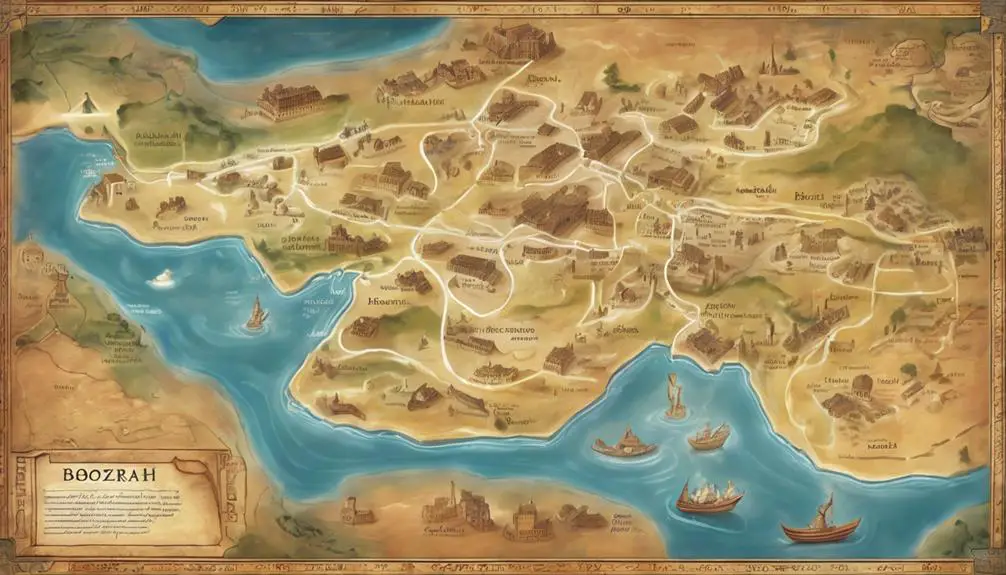
Understanding the significance of Bozrah within the biblical narrative requires a deep dive into its historical, economic, and cultural impacts on ancient societies and their enduring legacies. Bozrah's rulers played pivotal roles in shaping the city's destiny, serving as both political and military leaders. Their governance strategies, diplomatic relations, and defense mechanisms were instrumental in Bozrah's prosperity and influence in the region. These leaders' decisions, whether for alliance or conflict, directly impacted the city's standing among neighboring states and its representation in biblical accounts.
Furthermore, religious practices in Bozrah were deeply intertwined with its community life and political hierarchy. The city's religious institutions and rituals reflected a rich tapestry of beliefs that were central to its identity. These practices not only provided a moral and ethical framework for its inhabitants but also facilitated social cohesion and reinforced the authority of Bozrah's rulers. The integration of religious observances in public life underscored the significance of faith in shaping the city's social and political landscapes.
Analyzing Bozrah's significance thus reveals a complex interplay of leadership, religion, and culture. The city's rulers adeptly navigated the challenges of their time, leveraging religious practices to legitimize their authority and unite their people. This historical and cultural analysis highlights the multifaceted role Bozrah played in the biblical world, serving as a beacon of political power and religious fervor. Its legacy, preserved through biblical references and historical records, continues to offer valuable insights into the ancient world's intricacies.
Archaeological Discoveries in Bozrah
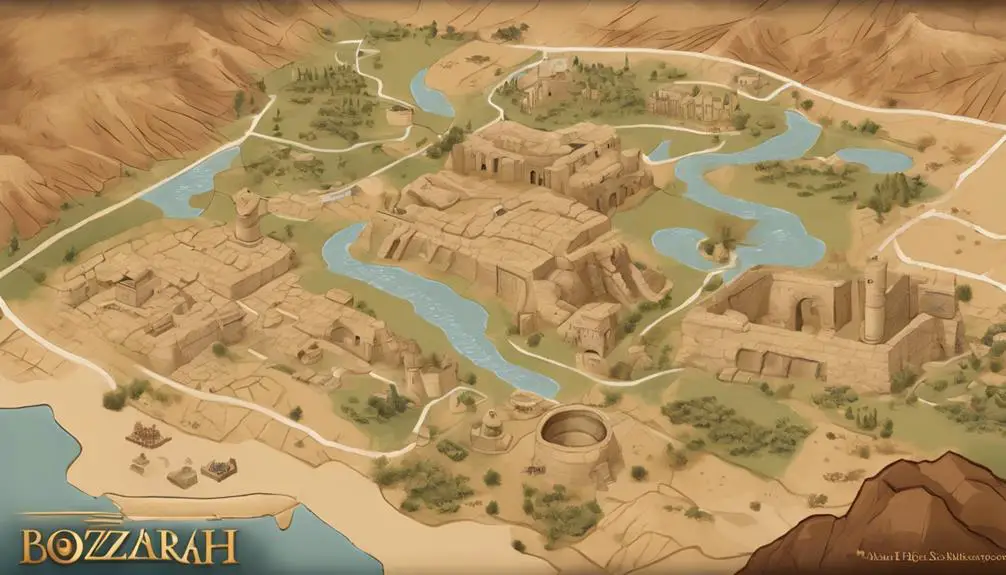
Shifting focus to tangible evidence, recent archaeological findings in Bozrah have unveiled artifacts and structures that further illuminate the city's complex history and cultural dynamics. These discoveries, achieved through meticulous excavation methods, offer a rare glimpse into the lifestyle, trade, and religious practices of its ancient inhabitants.
Here are four significant aspects of these findings:
- Advanced Excavation Techniques: Modern excavation methods have been crucial in uncovering Bozrah's layers of history buried beneath the surface. These techniques, ranging from remote sensing to controlled digs, have allowed archaeologists to map out the city's layout with remarkable accuracy.
- Architectural Insights: Structures unearthed in Bozrah, including homes, temples, and fortifications, reveal the city's architectural sophistication. The layout of these buildings, alongside their construction materials, provides clues about the societal hierarchy and the defensive strategies employed by the city's inhabitants.
- Cultural Artifacts: A wealth of artifacts, from pottery shards to intricate jewelry, has been discovered. These objects not only showcase the artistic prowess of the Bozrahites but also hint at the city's trade connections with neighboring regions. Artifact preservation efforts have been pivotal in ensuring these pieces endure for further study.
- Inscriptions and Texts: Perhaps most revealing are the inscriptions and texts found on tablets and walls. These writings offer direct insight into the language, religion, and governance of Bozrah, filling gaps in historical narratives previously constructed largely from external sources.
The archaeological endeavors in Bozrah, underpinned by sophisticated excavation methods and dedicated artifact preservation, have significantly enriched our understanding of this ancient city's role in the broader historical and cultural tapestry of the region.
Bozrah in Prophecy and Legend
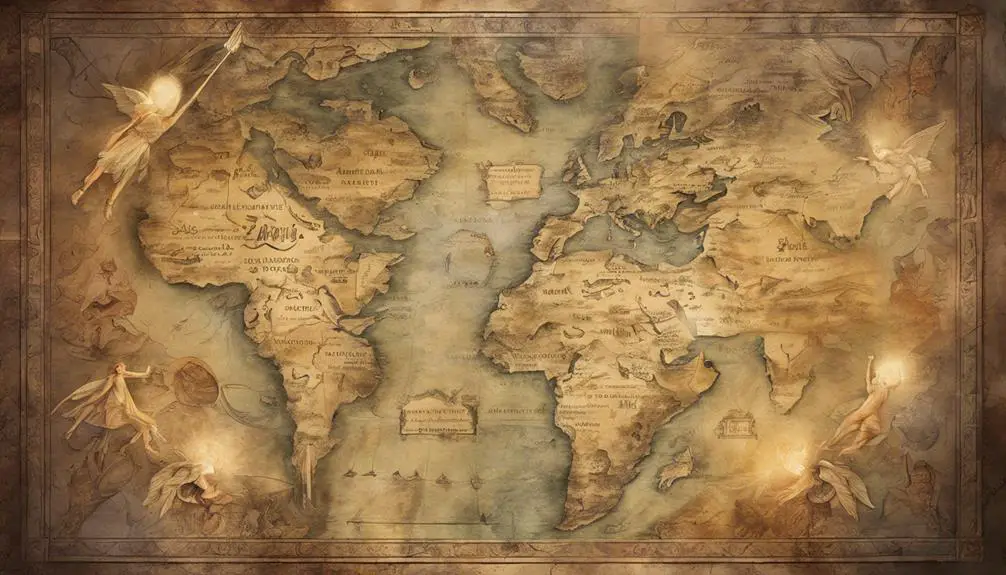
While archaeological discoveries provide tangible insights into Bozrah's historical and cultural landscape, the city's mention in ancient prophecies and legends offers a fascinating dimension to its legacy that warrants a closer examination. You'll find that Bozrah's role in prophetic interpretations and legendary tales isn't just a footnote in ancient texts but a significant chapter that has intrigued scholars and theologians alike.
In the realm of prophetic interpretations, Bozrah is often cited in discussions about the end times, particularly in the Book of Isaiah and the Book of Jeremiah. These texts depict Bozrah as a site of divine judgment and salvation, presenting a dualistic image that has led to varied scholarly debates. You're delving into a rich tapestry of theological discourse, where each verse containing Bozrah's name is dissected for its eschatological implications.
Legendary tales, on the other hand, imbue Bozrah with an aura of mystery and divine interaction. These stories, passed down through generations, often portray Bozrah as a place where the divine and the mortal realms intersect. You're not just reading about a historical city but exploring a symbolic landscape that has shaped the religious imagination of countless individuals.
Analyzing Bozrah in the context of prophecy and legend, you're engaging with a complex interplay of historical fact and spiritual significance. This approach doesn't just enrich your understanding of Bozrah's place in ancient narratives; it also allows you to appreciate the profound impact that such a city has had on the development of religious thought and tradition.
Modern Exploration of Bozrah
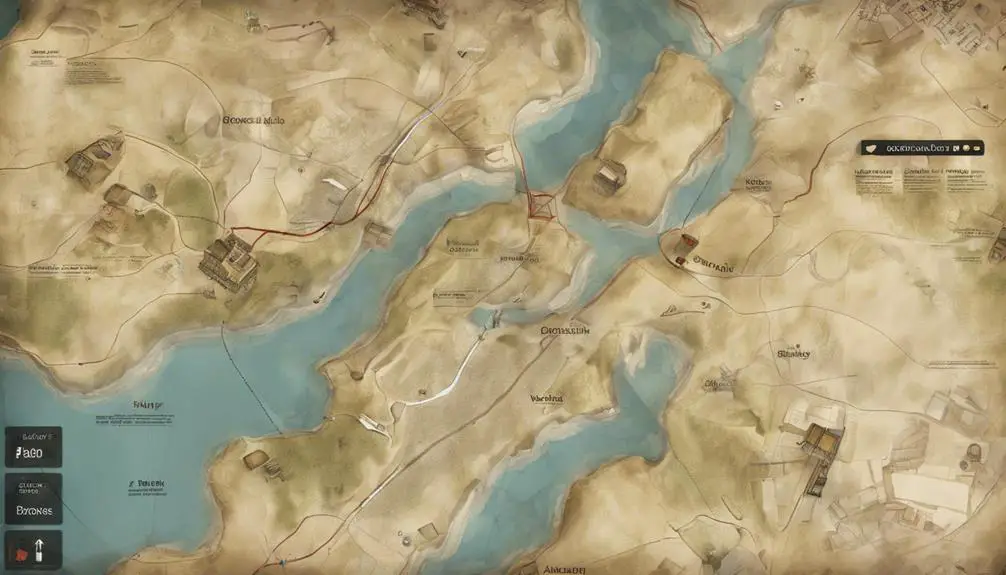
In recent years, numerous archaeological expeditions have sought to uncover the layers of history buried beneath Bozrah, offering a window into its past civilizations and their interactions. These efforts haven't only enriched our understanding of the ancient world but also contributed significantly to tourism development and the celebration of cultural festivals that honor the rich heritage of Bozrah.
Excavation Techniques: Modern exploration employs advanced archaeological techniques, including satellite imagery and ground-penetrating radar, to identify potential dig sites with minimal disturbance to the landscape. This approach has led to the discovery of previously unknown structures, providing new insights into the architectural practices and urban planning of ancient Bozrah.
Artifact Analysis: Artifacts unearthed during excavations undergo meticulous analysis. Through carbon dating, researchers have been able to establish timelines for the settlement and development of Bozrah, thereby offering a chronological framework for its historical narratives.
Cultural Festivals: The findings from archaeological expeditions have inspired the creation of cultural festivals in Bozrah. These events celebrate the city's ancient heritage, featuring reenactments, traditional crafts, and cuisine that draw tourists and scholars alike, fostering a deeper connection with the past.
Tourism Development: The revelations of Bozrah's ancient past have played a pivotal role in its tourism development. Historical sites, once buried and forgotten, have been transformed into attractions that allow visitors to step back in time and experience the city's storied history firsthand.
Through these modern explorations, the ancient city of Bozrah continues to reveal its secrets, enriching our understanding of the past while contributing to its future through tourism and cultural appreciation.
Frequently Asked Questions
How Did the Climate and Environment Around Bozrah Influence Its Historical Development and the Lifestyle of Its Inhabitants?**
The climate and environment around Bozrah significantly shaped its historical development and the lifestyle of its inhabitants. Geological formations and water sources, crucial for agriculture and sustaining life, influenced settlement patterns.
The area's climate dictated the types of crops grown, affecting the economy. Moreover, the natural landscape provided defense and influenced architectural styles.
Understanding these environmental factors offers insight into the daily lives and societal evolution of those who lived in Bozrah.
What Were the Economic Foundations of Bozrah in Ancient Times, and How Did Its Location Contribute to Its Prosperity or Decline?**
You're exploring how Bozrah's economy thrived in ancient times, focusing on its strategic location. This city's prosperity hinged on trade routes, making it a commercial hub.
Architectural remnants hint at a bustling marketplace and diversified economy. Moreover, religious practices, evident in the archaeological findings, suggest a socio-economic structure influenced by faith, attracting pilgrims and boosting the local economy.
Its position facilitated both its rise and, eventually, its decline when trade routes shifted.
Can You Detail the Linguistic Evolution of the Name 'Bozrah' and Its Meanings in Different Historical and Cultural Contexts?**
You're exploring the name etymology and cultural significance of 'Bozrah.' This term's linguistic journey is fascinating, reflecting its historical and cultural layers.
Initially, its roots suggest a meaning related to sheep or enclosures, hinting at pastoral origins. Over time, 'Bozrah' accumulated diverse connotations across cultures, evolving in resonance.
Analyzing its transitions offers insights into the region's social fabric, showcasing how names encapsulate the essence of their era's economic and cultural landscapes.
How Did Bozrah Feature in the Trade Routes of the Ancient Near East, and What Goods Were Commonly Traded Through or Produced in Bozrah?**
Imagine stepping back in time, where Bozrah thrives as a hub in ancient trade routes. You'd find it bustling with merchants trading goods like spices, textiles, and perhaps goods bearing religious significance. Bozrah's strategic location and architectural innovations facilitated its role in this network.
Analyzing its role offers insights into the economic and cultural exchanges that shaped the region. It's not just a city; it's a testament to ancient commerce and ingenuity.
What Role Did Bozrah Play in the Conflicts and Alliances of Its Time, Especially in Relation to Neighboring States and Empires?**
You'd find Bozrah played a crucial role in ancient conflicts, leveraging its military strategies and religious significance to form or resist alliances with neighboring states and empires. Its strategic location made it a focal point for military campaigns, while its religious landmarks influenced diplomatic relations.
Bozrah's actions in warfare and alliances showcased a deep understanding of the geopolitical landscape, impacting the broader dynamics of power in the ancient Near East.
Conclusion
Ironically, despite its biblical significance and the layers of history buried beneath its ancient soils, Bozrah remains more a relic in religious texts than a blockbuster find in modern archaeology.
You'd think, with its prophetic mentions and storied past, excavators would be elbow-deep in its dirt, uncovering revelations by the day.
Yet, here we are, relying on ancient texts to map out a city that, in contemporary terms, seems almost mythical.
This scholarly juxtaposition between historical importance and current obscurity offers a fascinating narrative twist, highlighting how the sands of time can both preserve and obscure the footprints of our ancestors.


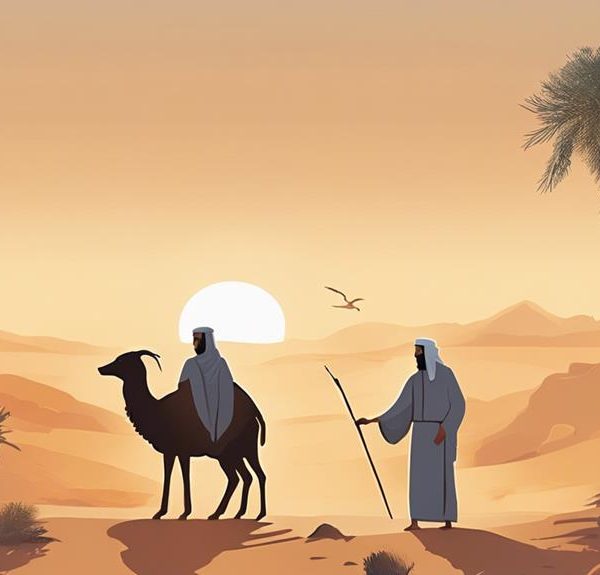
Sign up